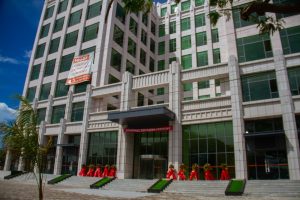UN Agency Challenges Tanzania To Boost Sorghum Production To Cater For Skyrocketing Demand In The World Market
By Valentine Oforo
UN Agency has challenged Tanzania to heighten production
of sorghum in order to cater for the skyrocketing demand of the grain and
pro-planet crop in the world market.
The Monitoring Officer at the UN’s World Food
Programme (WFP), Mr William Lasway unveiled that demand by the world’s largest
humanitarian organization was to purchase at least 200,000 tons of sorghum from
Tanzania per a season but the country is falling to serve for the demand.
He communicated that WFP has been purchasing huge
volume of sorghum with an eye to roll out humanitarian supports to the population
in need into different countries across the continent, especially in Sudan, Somalia
and Burundi.
He raised the concern during a special forum which
attracted the stakeholders in the country’s sorghum crop, including the
farmers, buyers, seeds producers as well as those involving in the fertilizer
sector.
Convened in Dodoma Capital City, the key gathering was
graced by the Dodoma Regional Commissioner (RC), Rosemary Senyamule and was
tailored to provide a useful podium for the participants to brainstorm over the
development of the vital agricultural sub-sector.
“Tanzania has been endowed with favorable
agroclimatic zone and suitable soil for the cultivation of the crop, but much
efforts are needed to be put in place to assist the farmers to engage into vast
and professional production of sorghum,” he observed.
Lasway however revealed that WFP has for a long time
been working collaboratively with the government to assist the local farmers to
increase production and productivity in the sub-sector, being in efforts to
enable them getting the needed tonnage in each season.
“Most of the involved growers are still far from reliable access to improved seeds varieties, the existing gap which need to
timely be contained, as well as improving interventions towards the value
addition to the crops produce,” he urged.
Speaking for his part, the Project Officer at the
Farm Africa, Mr. Meshack Panga informed that the international organization was running a specif project to scale up production of sorghum among the farmers in
all districts of Dodoma Region.
“Through the robust project, we have so far managed
to reach out to a total of 30,000 farmers across the districts and the
initiative continues to support the farmers until 2028 where it will phase
out,” he expressed.
Apart from assisting the sorghum farmers, according
to him, the vital initiatives also works to empower the seeds producers.
“When we started the project the price of sorghum
ranged between 200/- and 250/- per kilogram but we sensitized and assisted the
farmers to improve their production quality to the good extent that currently,
the prices has substantially increase to 800/- per one Kg,” he informed.
Mr. Patric Byeshulilo, an officer from Apeck
International Limited told the forum that his company was working to search for
vast markets for the crop in different countries, saying they have so far
managed to get market for at least 6,000 tons in Burundi.
The Quality Assurance Officer at the Cereals and
Other Produce Board of Tanzania (CPB), Ms Mwanahamisi Msangi said the
state-owned Board is the major buyer of the sorghum that produced but the local
farmers.
She briefed that during 2020/21 season CPB bought a
total of 1,000 tons whereby in 2021/22 season they purchased at least 3,000
tons.
“During 2022/2023 we purchased a total of 3,000 tons
and our expectations is to purchase at least 10,000 tons come next season,” she
expounded.
Agricultural and Marketing Officer at the Tanzania
Agricultural Seed Agency (ASA), Mr Ezekiel Noah said for the current season,
the Agency has in stock a total of 200 tons of improved seeds for assisting the
farmers.
He detailed that, as per the Agency’s
indicative prices, one kilogram of the seeds will be available
to the growers at a patriotic price of 3,000/-.
In her closing remarks, the Dodoma Regional
Commissioner (RC), who chaired the forum expressed that the government in the
region has directed that each municipal council to set aside a total of 2,000
hectares to support professional cultivation of the crop in order to meet markets demand.
To
further improve performance of the sector, FARM Africa is implementing a robust
project to help introducing at least 100,000 sorghum farmers
in Dodoma region to Climate-Smart Agriculture techniques.
With the
generous funding packages from Irish Aid, the Mastercard Foundation, and the
World Food Programme, the ambitious project gives the farmers access to better
seeds and improved post-harvest practices, among others.
“Despite
facing dry conditions in 2023, through the project, the beneficiary farmers
have achieved an incredible 300 percent increase in sorghum production. And
they’re now selling their sorghum for up to 780/-per kilo this year, compared
to just 250/- per kilo three years ago,” Dan Collison, the Chief Executive
Officer (CEO) at Farm Africa expressed during his special tour of the farmers.
He
expressed that, in the semi-arid region of Dodoma, most of the smallholder
farmers rely on the sorghum they grow to feed their families, but low yields
have regularly pushed people into hunger.
“An
increasingly volatile climate endangers smallholders’ food security. Adopting
improved sorghum varieties and production practices is vital in allowing the
farmers to achieve a surplus, even in drought conditions,” he observed.
And the
CEO informed that, during the first phase of the project which ran from 2019 to
2022 the sorghum growers in Dodoma were equipped with the skills , the
development which assisted them to transform from subsistence to commercial
agriculture and thus, saw them increasing productivity of sorghum farming by 30
percent.
“During
the project’s first phase, we managed to support the involved farmers to adopt
new techniques that boost yields, build resilience to extreme weather and
protect the environment. Moreover, we train them in warehouses and cooperatives
to process and store farmers’ produce,” he informed.











